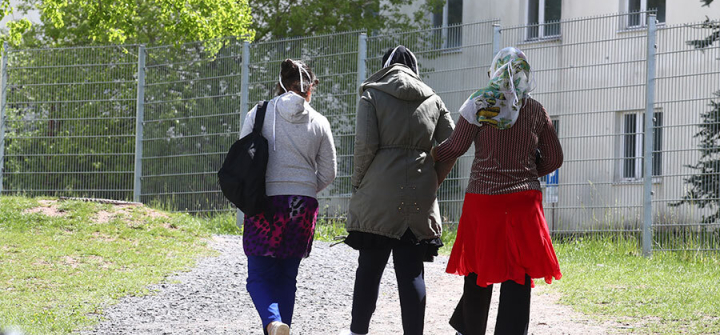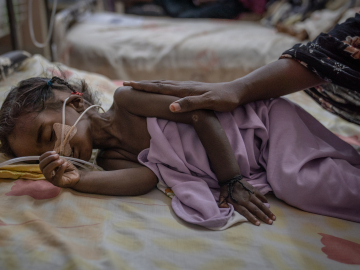Germany and COVID-19: What About the Refugees?
Facemasks, second-by-second case number updates, and scavenged supermarkets: The COVID-19 outbreak has shaken life in Germany to its core. In her first unscheduled televised speech of her 16-year term on March 18, Chancellor Angela Merkel called the outbreak the biggest “challenge to our country that depends…on our joint solidarity” since World War II. Everyone is exhorted to practice “social distancing” and to stay home.
Due to a mixture of luck, a timely reaction, and a robust public health care system, Germany has managed to keep death rates low. The country quickly implemented widespread PCR testing as well as triage systems, while clinical operations have been streamlined towards the virus in hospitals all over the country. This has been recognized by many international voices, who consider Germany as a paradigm in Europe for combatting COVID-19.
But what is the situation for refugees currently living in Germany? In 2019, 142.409 asylum applications were lodged at the Federal Office for Migration and Refugees (BAMF). The statistics show that only 1.3% of refugees are over 60 and cannot be classified as a risk-group per se. However, many of them have a deteriorated physical and mental health status, as well as undiagnosed underlying health conditions that make them particularly vulnerable. A 2018 cross-sectional study at a refugee clinic in BMC Family Practice showed that the most common impairments in health needs of asylum seekers were respiratory ailments (17,4%). Depending on the severity, an additional SARS-CoV 2 infection on top of these impairments could easily lead to severe respiratory symptoms like pneumonia.
Credible news in the languages the majority of refugees speak is scarce. Noncitizens often have to pick up pieces of information themselves through their own social networks. But especially in times like these, when events come thick and fast, missing or misleading information can lead to fear and irrational decisions. On March 13, the municipality of Suhl in Thuringia state decided to put an entire reception center of more than 500 people into complete lockdown, after one new arrival was tested positive. Yet the reason for this curtailment of freedom of movement wasn’t communicated to the residents. Rumor soon spread that these measures were a prelude to a mass deportation and 22 refugees tried to flee.
Limited space in camps means strict isolation of the infected is not possible: 400 of 600 refugees of one reception center in the state of Baden-Wuerttenberg have tested positive. Quarantining multiple people in shared spaces not only increases the risk of infection and but also has a negative impact on refugees’ mental health. There is lack of soap and hand disinfection supply and many refugees have to share the same sanitary installations. One solution that is currently discussed could be to put them up in quarantine in hotel rooms currently lying empty.
German NGOs, like Pro Asyl, have begun translating information about the pandemic into the refugees’ native languages ( to clarify the need for hygiene and social distancing). However, this will not make a difference if the residents are not equipped with sufficient amount of soap, disinfectants and sanitary installations.
And, quite a few refugees are experienced health care workers. The state of Saxony has reacted and could be a model by lowering administrative barriers to facilitate the work permits of trained health workers.
Other states should follow suit and harness a ready and sensitized workforce in the fight against the coronavirus.
It’s clear that refugees in Germany are a particularly vulnerable population that needs protection during this pandemic. These are trying times that call for solidarity within the European Union. Germany has already taken the first step, by flying in hospitalized patients to relieve the overwhelmed Italian health care system. ( Now, Germany has the unique chance—together with the other nations of the European Union—to stand in solidarity and adopt measurements in order to help its most vulnerable. But it seems that so far, the “joint solidarity” Merkel called for, does not include refugees.
David Kamiab Hesari is a medical doctoral candidate, Germany; Marrium Habib, MD, MPH, is co-coordinator of the Center for Global Health TUM, Germany; Muhammad Zaman, PhD, is a professor at Boston University; and Clarissa Prazeres da Costa, MD, is a professor and co-director of the Center for Global Health TUM, Germany.
Join the tens of thousands of subscribers who rely on Global Health NOW summaries and exclusive articles for the latest public health news. Sign up for our free weekday newsletter, and please share the link with friends and colleagues: https://www.globalhealthnow.org/subscribe
Asylum seekers go for a walk on the grounds of the initial reception centre in Suhl, Germany which is being converted into an isolation and quarantine area. May 12, 2020. Image: Bodo Schackow/picture alliance via Getty




